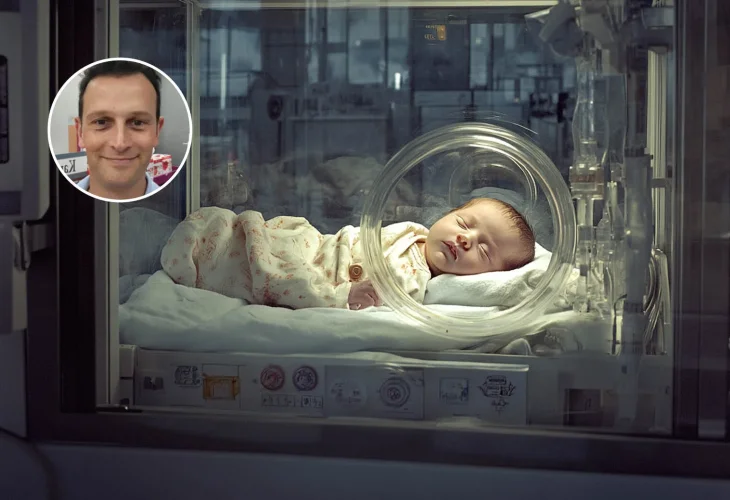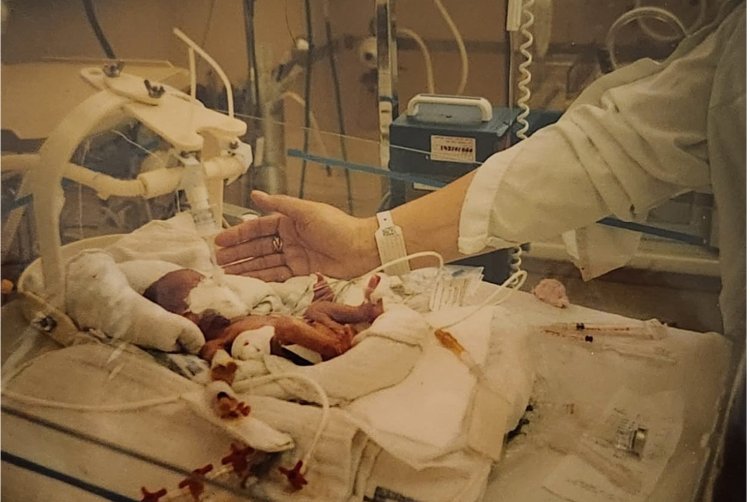Unexpected Miracles: A Doctor's Journey with Premature Babies
Dr. Yotam Almagor initiated Israel's inaugural home hospitalization program for premature babies and has witnessed countless heartwarming stories. Discover the inspiration behind this unique initiative and the fates of the babies he's accompanied.
 Inset: Dr. Almagor
Inset: Dr. AlmagorFor nearly two months, Hodaya's parents waited for the moment she would be released from the NICU. Following a complicated emergency birth, heart defects, and surgery, they anticipated just one thing – seeing her at home. However, as the long-awaited day arrived and little Hodaya was about to be discharged, they were overwhelmed with fear.
The realization that such a fragile baby would be home with them, and they would be solely responsible for her life, including operating the oxygen generator and the saturation monitor she required nightly, put them under tremendous stress. Until then, at the NICU, they felt like guests – visiting daily and leaving, surrounded by a medical team, nurses, and doctors. Now, they were moving to the real thing, becoming the only caretakers of their infant daughter.
Then, on the evening of her discharge, they received a phone call that provided the reassurance they so desperately needed. On the line was Dr. Yotam Almagor, a former neonatologist at Hadassah Hospital, who was now running a pilot of a unique program, accompanying infants and premature babies in complex situations from their hospital release until they acclimate to the community. Dr. Almagor informed the parents that Hodaya would be added to his list of young patients, and he would be available for any questions or requests, including regular home visits at their residence.

The Idea: Home Hospitalization for Preemies
In a conversation with Dr. Almagor, he noted that this is truly a unique program operating under the supervision of Dr. Menachem Beitan, the regional physician at Meuhedet, for the past four years. "Within the framework of the program, I accompany babies from the moment they are discharged from the hospital until they integrate into the community. This work is incredibly fulfilling. I feel it is a great mission to help parents in such situations," he explains.
How did the program start? Where did the idea come from?
"It might sound funny, but the idea came almost by accident during the COVID pandemic. On one occasion, I was asked if I could visit a quarantine hotel to examine a five-day-old baby with jaundice. I volunteered, geared up, and went. The examination was routine and ended quickly. The following week, I visited the baby again, this time at her home."
The story ostensibly ended there, and he didn't see the family again. However, from this need and understanding the importance of home visits for such small infants, Dr. Almagor conceived the idea to establish the first-of-its-kind home hospitalization program for preemies and complex infants in the country. As a practical person, he quickly set it into motion: writing a proposal, submitting it, and gaining approval to pilot it.
Around four years have passed since Dr. Almagor and his team began intensively treating five premature babies released to their homes. Those early little ones were the starting point for blessed actions: since then, they have devotedly cared for dozens of premature and complex infants at home, avoiding unnecessary hospitalizations and providing safe medical care at home. Additionally, they have been a source of support and encouragement for parents, providing them with security and joy.
"I do not work alone," emphasizes Dr. Almagor. "The team includes a social worker, dietitian, nurse, and speech therapist. Together, we build a personalized plan for each baby before their hospital discharge, ensuring they receive the most encompassing and professional care possible."
Dr. Almagor emphasizes that the program is not designed for all preemies but only those in extreme conditions – very low weight, oxygen dependency, high risk of infections, and more. "This is why until today, we've accompanied dozens of infants and no more, and that's good," he clarifies.
 (Photo: shutterstock)
(Photo: shutterstock)Close Accompaniment
What happened until today? How did parents of preemies handle situations like you describe?
"They truly went through complex and challenging periods, which is why this initiative makes so much sense. Health plans have the ability to care for such children, but until now, they rarely exercised it because these are extreme and rare cases with no existing framework. Until today, these infants were generally cared for at home by their parents, where the difficulty is immense, and there was not always someone to consult with, or they were often hospitalized too frequently, which is not beneficial for anyone, especially not for such small infants, almost without an immune system.
"Since I previously worked in the preemie department and as a physician at Meuhedet health fund, I was familiar with this reality and aware that the health fund, as an advanced and professional body, has resources and capabilities to care for these children. Hence came the decision – to partner with their parents right from the initial hospital discharge and simply be with them. Not to burden them with waiting for long lines with their baby at the health fund each time, exposing them to children and infectious diseases, but to come to them at home and also closely monitor, with a clear understanding of their medical file and alertness to all that they require."
So how does the program work in practice?
"In most cases, health fund units in hospitals identify these babies and forward their details to me. After that, I contact the family and the treating team, and I strive to visit the child before their hospital discharge. From that moment, instead of being passed from one doctor to another, I become the permanent address for everything concerning the family, available 24/7 for these children."
Dr. Almagor notes that from experience, it is initially all new and stressful, as adjusting to home after months in the NICU is not easy. "But I am there to assist in the acclimation process," he clarifies. "I visit the parents, sometimes day after day, and not only monitor the medical condition of the baby but also their integration at home. I teach parents how to manage the baby's care and also guide them on accessing the diverse services these babies need through 'child development' or elsewhere.
"Additionally, I become the treating physician for these children throughout the first months of their lives. The stage where we part ways is reached only when the baby's condition stabilizes, and simultaneously the parents already know how to navigate the system well and hence are less in need of this close accompaniment."

A System of Miracles
Many are the moving cases Dr. Almagor has accompanied through the program. "We have had babies who were very ill or significantly impaired. There were those who weren't given a chance to survive in the hospital, yet they are still with us, developing at their own pace, but often succeeding in surprising us greatly when they are weaned off ventilation, learn to eat well, and even begin interacting with their surroundings, making sounds, and progressing physically.
"There was a preemie born at 24 weeks, which is a stage where very few infants survive, and even those who do often face significant adversity. After a four-month NICU stay, he was released home in a complex state with a very challenging diagnosis. Yet, he did the unimaginable and made strides in every possible domain, with our biggest surprise being that he began walking before turning one.
"Another baby we accompanied had parents who were told that his vision system hadn't developed, and he would likely not be able to see, yet today he sees well and doesn't even need glasses. Of course, alongside the miracles and emotional stories, there are less optimistic cases. Unfortunately, there are children who remain very ill, and there are those who have passed away, and the pain, of course, is immense and stays with me to this day."
When Dr. Almagor talks about his "preemies," his love and connection to them resonate in his voice. "We become a kind of family, and even at night, I sleep with my phone by my side, accustomed to being awakened every so often to hear about a baby coughing relentlessly or to decide whether to take the baby to the hospital for any reason, or if it can be treated at home. Many times we connect via video call, allowing me to see the baby up close and advise most professionally because I know them and recognize how they look on a usual basis."
Dr. Almagor notes that the moment he releases a baby to transition care with the community is always the happiest yet the hardest moment for him. "It's not easy for me to leave babies I've accompanied right from when they arrived home," he admits. "Happily, many of them send me pictures every birthday, and I continue to follow up, seeing how they grow and being thrilled by their every step and progress. The main thing is that they should always be healthy."

